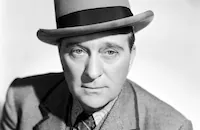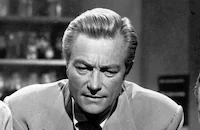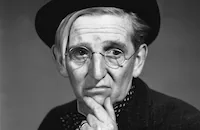The Big Broadcast of 1938
Brief Synopsis
Cast & Crew
Mitchell Leisen
W. C. Fields
Martha Raye
Dorothy Lamour
Shirley Ross
Lynne Overman
Film Details
Technical Specs

Synopsis
Radio announcer Buzz Fielding's girl friend, Dorothy Wyndham, bails him out of jail, where he landed after skipping alimony payments to his three ex-wives, in time to board the S. S. Gigantic for the race against the S. S. Colossal , to cross from New York to Cherbourg in two and a half days. T. Frothingill Bellows, president of the line that owns the Gigantic , buys his accident-prone brother S. B. a ticket on the Colossal . S. B. delays boarding with a vigorous round of golf, using a motorized cart that turns into a small plane which he eventually uses to land on the deck of the Gigantic . The ship is equipped with a special turbine engine invented by Bob Hayes, but S. B. breaks it with his umbrella and then refuses to allow its use, causing the ship to fall behind in the race. Dorothy and Bob fall in love while he fixes the engine. Buzz announces the ship's entertainment in radio broadcasts, while he and his three ex-wives, eager for their alimony, anticipate winning the race and $50,000. Grace, one of Buzz's ex-wives, diverts S. B.'s attentions from Bob while he fixes the engine. Cleo, another ex-wife, reminisces with Buzz, and they slowly rekindle their love. S. B.'s daughter Martha, also accident-prone, is rescued at sea and wreaks havoc aboard the ship. Finally, Buzz fixes the engine and the Gigantic speeds ahead, at one point with S. B. at the helm. They win the race by a nose, and Buzz and Cleo happily reunite, leaving Dorothy and Bob free to continue their romance.

Director

Mitchell Leisen
Cast

W. C. Fields

Martha Raye

Dorothy Lamour
Shirley Ross

Lynne Overman

Bob Hope

Ben Blue

Leif Erikson

Patricia Wilder
Grace Bradley
Rufe Davis
Lionel Pape
Dorothy Howe

Russell Hicks
Kirsten Flagstad Metropolitan Opera Co.
Wilfred Pelletier Metropolitan Opera Co.
Shep Fields And His Rippling Rhythm Orchestra
Archie Twitchell

James Craig

Richard Denning
Michael Brooke
Jack Hubbard
Bill Roberts
Clive Morgan
John Huettner
Bruce Wyndham
Kenneth Swartz
Edgar Norton
Stanley King
Rex Moore
Bernard Punsley
Don Marion
Billy Daniels

James Conlin
Sherry Hall
James Burtis
Jack Dougherty
Rudolph Amendt
Tiny Newland
Harry Wilson

Irving Bacon
Wally Maher
Muriel Barr
Sheila Darcy
Ray Hanford
Don Brodie
Frank Du Frane

Mae Busch
Jerry Fletcher
Robert Allen
Auguste Tollaire
Charles Millsfield Sr.
Charles Teske
Jack Dawson
Ted Meredith
Pete Theodore Rand
Edward Cutler
Ted O'shea
John Jennings
Harvey Karels
Gus Glassmire
Lal Chand Mehra

Mary Maclaren
Florence Wix
Carol Holloway

Gertrude Astor
Nell Craig
Ethel Clayton
Gloria Williams
Marion Weldon
Yvonne Duval
Dorothy Dayton
Gwen Kenyon
Norah Gale
Harriette Haddon
Joyce Mathews
Virginia Pound
Suzanne Ridgway
Dorothy White
Helaine Moler
Paula De Cardo
Crew
Charles Althouse
Edgar Anderson
Frederick Hazlitt Brennan
Russel Crouse
Walter Deleon
Hans Dreier
Ken Englund
Ernst Fegté
W. C. Fields
Harry Fischbeck
Arthur Franklin
A. E. Freudeman
Tito Guizar
Edith Head
Chandler House
Gordon Jennings
Don Johnson
William Lebaron
Howard Lindsay
Francis Martin
Gene Merritt
Boris Morros
Leroy Prinz
Ralph Rainger
Leo Robin
Leon Schlesinger
Harlan Thompson
Richard Wagner
Eda Warren
Adolph Zukor

Film Details
Technical Specs

Award Wins
Best Song
Quotes
Say, do you know anything about electricity?- First reporter
My father occupied the chair of applied electricity at State Prison.- S.B. Bellows
Oh, I'm so sorry, Mr. Bellows. I didn't recognize you in this bad light.- Grace Fielding
Ah, everybody seems to see me in a bad light.- S.B. Bellows
Aren't you awake yet?- Lord Droopy
Ohhhhh! I don't know. I haven't looked yet.- S.B. Bellows
Meet me down in the bar! We'll drink breakfast together.- S.B. Bellows
I was married to him for eight months; I gave him the best years of my life!- Divorcee
Trivia
Notes
Included in the Paramount story files at the AMPAS library are an early story outline by Frederick Hazlitt Brennan casting Jack Benny in the lead role; a story outline by J. P. McEvoy; and five sequences written by W. C. Fields, titled "Gas station routine," "Golf routine," "Barber shop routine," "Pool room routine" and "Orchestra routine." McEvoy did not receive final writing credit. The film marked the feaure-film debut of Bob Hope (1903-2003) and the last of Paramount's Big Broadcast series. According to an article in New York Times, this was Fields's first role following a long illness. The sequence in which Kirsten Flagstad appears was filmed at the Eastern Service Studios at Astoria, Long Island, while the rest of the film continued production in Hollywood. According to a New York Times article, the elephant number in this film bent the stage so that it was unusable.
In his biography, Mitchell Leisen stated that he made a direct recording on the first take of the song "Thanks for the Memory," which was sung by Hope and Shirley Ross, accompanied by a 90-piece orchestra. The tune, which became Hope's theme song, won the 1938 Academy Award for Best Song. Leisen credited Ted Reed with directing Fields's golf and pool routines. Leisen stated that he had his first heart attack on the final night of shooting. For more information on the series, see the entry for The Big Broadcast above.

Miscellaneous Notes
Released in United States 1938
Feature acting debut for comic Bob Hope.
Released in United States 1938











